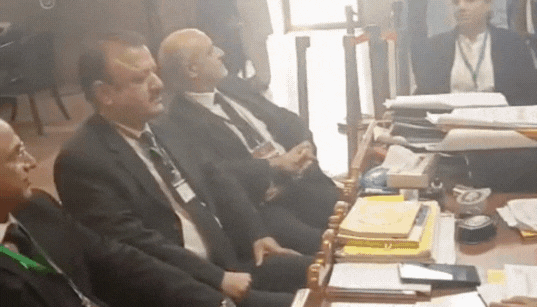Rifts deepen in Pakistan judiciary as high court judges contest chief judge’s authority in top court
Five IHC judges filed petitions in the apex court against high court chief justice's administrative actions, as well as ruling barring Justice Jahangiri from duties
Ali Hamza
Correspondent
Ali; a journalist with 3 years of experience, working in Newspaper. Worked in Field, covered Big Legal Constitutional and Political Events in Pakistan since 2022. Graduate of DePaul University, Chicago.

Islamabad High Court judges at the Supreme Court on September 19, 2025.
Nukta
Rifts widened on Friday within a Pakistani high court as five sitting judges filed legal challenges against their chief justice’s administrative decisions and his suspension order against a fellow judge.
In a joint petition filed under Article 184(3) of the Constitution, Islamabad High Court (IHC) Justices Mohsin Akhtar Kiyani, Babar Sattar, Sardar Ejaz Ishaq Khan, Arbab Muhammad Tahir, and Tariq Mahmood Jahangiri questioned the limits of the IHC Chief Justice’s – Justice Sardar Mohammad Sarfraz Dogar - authority.
The judges argued that judicial powers cannot be curtailed through administrative measures and stressed that under the Constitution, only Article 209 empowers the Supreme Judicial Council (SJC) to take action against judges.
Their petition raised several key objections:
- The Chief Justice cannot terminate or restrict the judicial functions of other judges through administrative authority.
- Pending cases cannot be shifted from one bench to another at the Chief Justice’s discretion.
- Judges available to work cannot be removed from the court roster.
- Under Article 202, benches may only be constituted according to prescribed rules, not personal preference.
- The “Master of the Roster” doctrine - previously struck down by the Supreme Court -cannot be revived through administrative committees.
The plea sought to nullify recent notifications issued by the IHC’s administrative committees on February 3 and July 15, along with other steps that, in their view, undermined judicial independence. The judges also described recently framed IHC rules as unconstitutional, insisting that the high court cannot issue a writ against itself under Article 199.
The move reflects growing resistance to CJ Dogar’s decisions, including case transfers and reshuffling of rosters, which critics see as concentrating power in his office.
Challenge to Justice Jahangiri’s suspension
In a parallel development, the same five judges filed individual petitions in the Supreme Court, contesting an IHC bench’s decision to bar Justice Jahangiri from performing judicial duties until the SJC rules on the validity of his law degree.
The petitions, filed in person and without legal counsel, argue that suspending a sitting judge amounts to bypassing constitutional protections. Justice Jahangiri, along with Justices Kiyani, Sattar, Khan, and Tahir, personally completed biometric formalities at the Supreme Court before filing their cases.
The suspension order had been passed by a bench headed by Justice Dogar earlier this week, following a complaint lodged in 2023 with the University of Karachi alleging that Justice Jahangiri’s law degree was fake. The university previously declared the degree and mark sheets invalid, citing irregularities such as dual enrollment numbers.
However, the Sindh High Court had suspended the order, stating that the varsity did not allow the judge a hearing before passing the order.
At the hearing, the IHC appointed amici curiae and sought the attorney general’s opinion on the maintainability of the petition. Critics, however, warned that allowing such petitions against judges could set a dangerous precedent.
Justice Jahangiri is among the group of judges who earlier alleged interference by intelligence agencies in judicial affairs, and his suspension has fueled suspicions of deeper institutional rifts.
‘God forbid we take inspiration from Justice Isa’
Responding to reporters gathered outside the SC as the judges filed their petitions, Justice Kiyani, when asked whether he had taken inspiration from former Chief Justice Qazi Faez Isa to file his own petition, dismissed the suggestion, saying “Allah na karay hum un se inspiration lain” (God forbid we take inspiration from him).
The former top judge faced controversy for his rulings, including blocking jailed ex-prime minister Imran Khan’s party from contesting the 2024 election under its name and symbol.
Justice Babar Sattar was asked how the group would respond if the registrar’s office raised objections to the petitions. He replied, “We’re 500 meters away from here [at IHC]; we will remove the objections.” Justice Jahangiri added that they would return if any objections were raised.
Justice Sattar, noting the lack of case assignments, quipped, “Hamaray pas wese hi kaam kam hai ajkal” (We already have little work these days). He and Justice Sardar Ejaz Ishaq Khan have not been allocated many cases for more than a month.
In a lighter exchange, an institution branch officer told the judges they were “doing service to the constitution.” Justice Kiyani retorted, “Yaar apni nokri ka khayal karo” (Brother, worry about your job), hinting that openly supporting the judges could land the officer in trouble.
When Justice Jahangiri was asked, "Is your resignation on the cards?" he replied, “We will fight till the end.”
Nukta asked Justice Kiyani, "What would you have done right now if you were head of any lawyers’ association?" he replied, “Wakalat krta, ab yehi daikhna hai k wakalat ka mayar ab kesa ho gaya hai” (I would have practiced as a lawyer; now it remains to be seen what the standard of law practice has become).







Comments
See what people are discussing